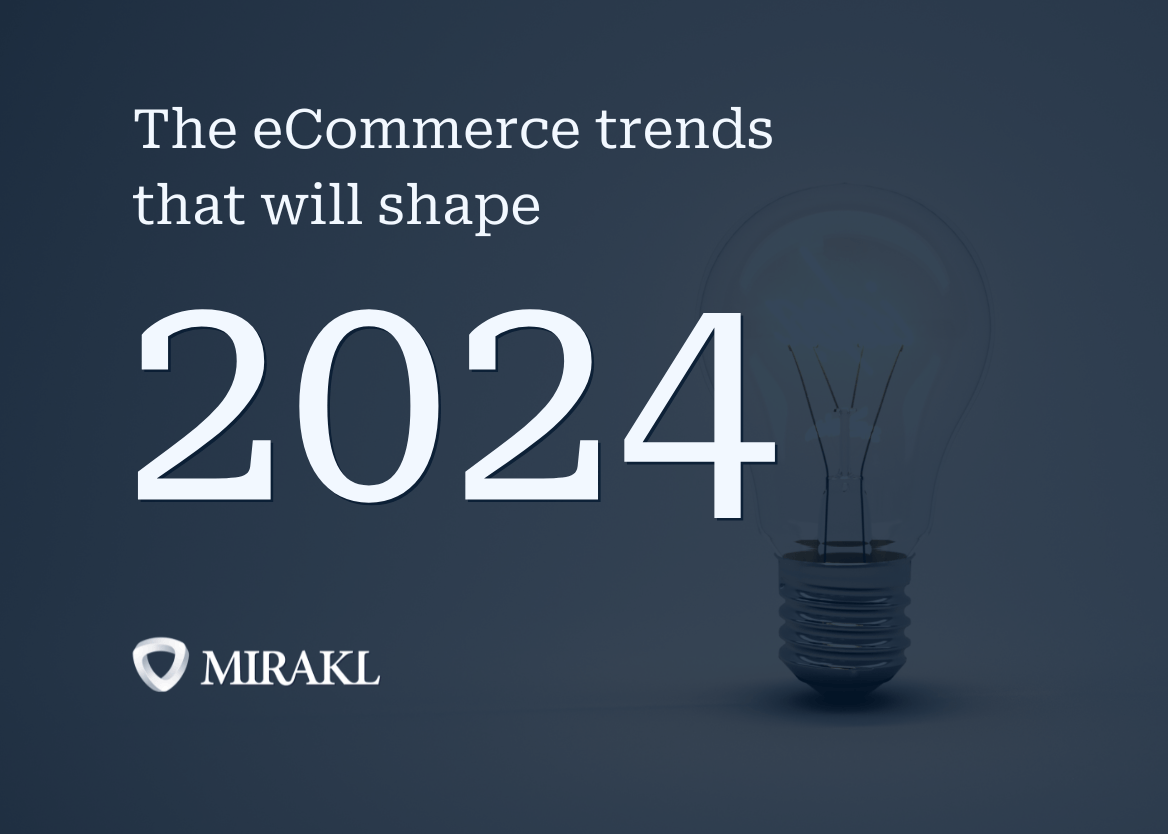Embrace these 2024 eCommerce trends to grow your business online next year

Propelled by unpredictable changes in the market, increasing buyer demand, and technological innovation, the eCommerce sector is under constant pressure to evolve. While online sales are predicted to grow, so are the expectations of buyers. Companies are up against even tougher competition to attract customers online and convert sales. We spoke with leading eCommerce tech experts to get their take on the 2024 eCommerce trends that will drive the growth of online platforms in the year to come.
1. Retail media provides retailers a path to profitability
Retail media is projected to reach $176 billion by 2028, surpassing advertising spend on TV. By enabling retailers to monetize their site traffic through sponsored ads, retail media enables retailers to unlock new revenue sources with margins of up to 70-90%. In 2024, retail media will continue to provide both brands and marketplace sellers with unparalleled access and visibility to relevant audiences. Marketplaces in particular will play a large role in the expansion of retail media as third-party sellers are keen on increasing the discoverability of their products and reaching new customers through retail media platforms offering measurable results.
Jean-Gabriel De Mourgues, Executive Vice President, Connect & Growth Solutions, Mirakl, commented, “The retail media networks of retailers, outside of existing tech giants, have the potential to capture the largest share of consumers and advertisers. In 2024, we’ll see industry pioneers finally grab their share of the retail media opportunity and seek more AI-powered solutions to optimize revenues while offering personalized customer experiences.”
Loading...
2. AI-first marketplaces will provide the most personalized eCommerce experience
2024 marks the start of the era of AI-first marketplaces. eCommerce players across both B2C and B2B industries should be looking to leverage AI to improve their operational efficiency and create a best-in-class and highly personalized shopping experience. AI-driven technologies make it easier to unlock the pool of supply (especially of third-party products, for companies operating online marketplaces), as well as generate increased demand from customers and monetization opportunities. For example, the shopping experience is being radically transformed by conversational commerce (think of the generative AI-powered chatbots that can help you find exactly what you’re looking for and offer recommendations based on your preferences).
Isabelle Bénard, Chief Product Officer, Mirakl, cited the impact of AI on the way consumers buy online: “In 2024, AI-driven innovations and conversational commerce will drive true change and disruption in the way consumers search, discover and shop at a pace never seen before”.
3. Secure transactions like contactless payments will become the norm to avoid fraud and data breaches
Data breaches are now the norm rather than the exception, and so payments security will be a critical area for advancement next year. Fraud prevention and credit scoring will deepen its usage and become more efficient thanks to generative AI and machine learning, as virtual card numbers, routable tokens, and pass key authentication are increasingly adopted. In addition, contactless payments that enable more secure transactions will become more common. In reality, the less payment data merchants have, the safer everyone will be.
4. Buy Now Pay Later options will be crucial to support consumers in a tough economy
43% of consumers use Buy Now Pay Later, double the year before, and as economic woes look set to continue, shoppers will continue to favor short-term financing payment structures next year.
Andy Barker, Executive Vice President, Financial Services, Mirakl, added, “As well as wanting more secure payment options, consumers are facing tighter purse strings. As a result, Buy Now Pay Later payment services will continue to gain more checkout share in this tighter economic market.”
5. Online marketplaces bring agility to retailers as consumers still cautious to spend
In retail, shoppers looking ahead to 2024 have little trust in a turbulent global economy that can have unpredictable disruptions in the market. Consumers are still under pressure and will be cautious when it comes to spending on consumer goods.
Retailers will need to dare to be bold in this tricky environment, to adopt disruptive technologies so that they not only survive, but also thrive during and beyond 2024. The marketplace and dropship models offer them the opportunity to develop a more agile business model and grow profitably, all without taking the risk of buying and storing new inventory.
Sophie Marchessou, Chief Customer Officer, Mirakl, said, “Many of our customers are using their marketplace to expand into new business areas in this environment. Take Debenhams, the UK retailer, who thanks to their marketplace could easily test new categories and products, such as the highly popular air fryer, without buying new inventory. Today, the air fryer is one of the best sellers on their website.”
6. B2B marketplaces are transforming the entire value chain across diverse industries
Over the past few years, we've seen the emergence of one-stop shops - an online destination where buyers can get everything they need to run their business - across multiple B2B industry verticals. Today, we are at an inflexion point, where those platforms are really helping digitize entire value chains. In several verticals where the ecosystem is ready, such as food & beverage, healthcare or agriculture, large suppliers are increasingly selling on B2B marketplaces, and customers are increasingly ready to place frequent orders on those platforms to gain time and efficiency. The automotive and construction sectors will be next.
Marc Teulières, general manager B2B, Mirakl, commented on what he expects to see in 2024: “We can also expect to see that more procurement organizations beyond wholesalers and manufacturers - like cooperatives, franchisees, group purchasing organizations - will adopt the platform model. In essence, they are already ‘offline platforms,' and now they are being compelled to digitize their businesses to become online ones. Next year, there will also be more convergence between traditional first-party eCommerce platforms and third-party marketplaces. The same invoicing, payment methods, pricing models and search methods … the overall objective is to really make the purchasing process completely seamless for the buyer."
7. More than just a passing trend - the circular economy is here to stay
A shift toward recycling and repairing products has been on the increase for years. Sustainable products now enjoy significant popularity among both consumers and B2B buyers. According to our survey of 9,000 consumers around the world, 53% of shoppers want the option to purchase from vendors with sustainable business practices, while a Gartner report found that 70% of the Supply Chain Top 25 have included circular economy principles as part of their innovation and design strategies. Buyer demand combined with ESG commitments and regulations that require manufacturers to recycle key components will see refurbished and recycled products in high demand in 2024.
Dropship and marketplace platforms provide a springboard for companies to commit to the circular economy. By providing increased interconnectivity among operators and third-party sellers, the marketplace model makes it easier for companies to integrate efficient supply chain strategies and refurbished products into their operations. Marketplaces also provide a platform for refurbished goods, creating new channels for products that may not have otherwise had a second life.
Loading...
Image: source
Mastering these trends will be key for any business looking to succeed in 2024. Speak with our team about how we can support you to achieve your growth objectives next year.



